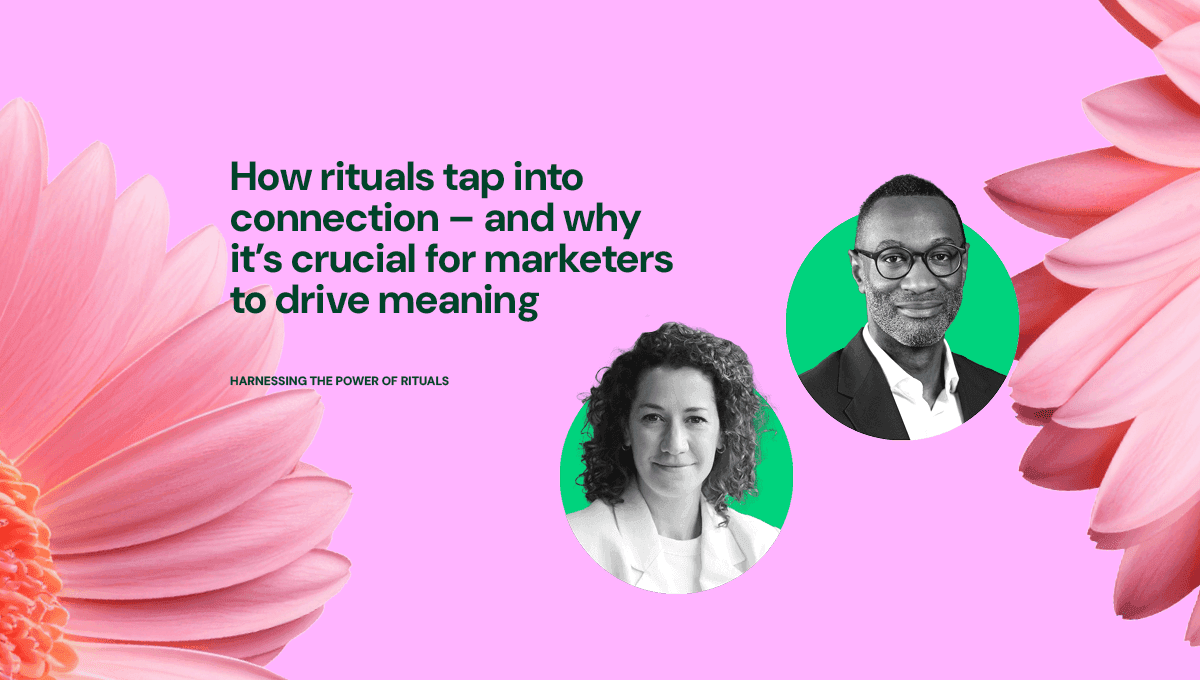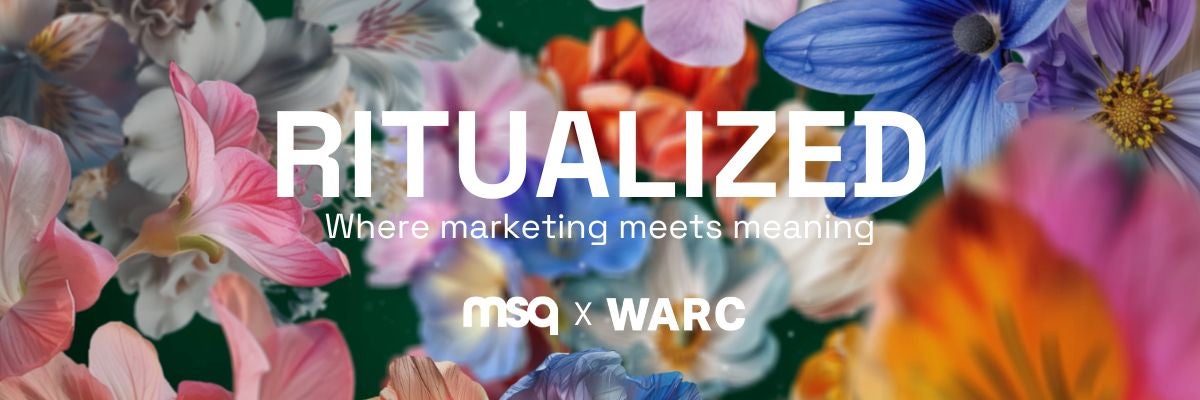 Home Page
Home PageHow rituals tap into connection – and why it’s crucial for marketers to drive meaning

As part of our research white paper in partnership with WARC, "Harnessing the Power of Rituals", we spoke to senior marketers across the globe to uncover their own experiences and insights around rituals, and their impact on consumers and brands.
In this first interview, Co-Managing Director of our insight and strategy consultancy, Freemavens, spoke to our client Samori Gambrah, Global Brand Director for Captain Morgan, Diageo.
To download the white paper and discover more about rituals, visit Ritualized.
What do you see as the role for rituals in your category, and why are they important?
Social rituals are where people come together and bond over shared experiences. These adapt and change, and they really reflect the evolution of social and cultural norms over time.
At Diageo, we believe our brands are at the heart of everything social, which gives us a strong view into what's important for consumers, and how we connect with our customers. If we want to be at the centre of those shared experiences, we need to invest in understanding them. We now have what we call the ‘Consumer Choice Framework’, which allows us to use data and research to understand how social rituals are changing over time. This means we can remain super objective and relevant with consumers.
And how do you see rituals evolving in recent years?
We accept that rituals will continue to evolve with cultural and social standards. We have a tool called ‘Foresight’, which is designed to help us track cultural and social trends through a variety of listening outputs and inputs.
Imagine a world where we can start to envision exactly what rituals, trends and occasions will look like in ten years’ time. I believe this is the power of an organisation like Diageo – its size and scale means we are able to be a consumer-first business, which is critical in FMCG and CPG.
We’ve seen an interesting trend in the non-alcoholic drinks category. We're seeing it grow by +7% over the next five years. More importantly, a fifth of all non-alcohol consumers are new entrants into this category - it's a rising trend. It now boils down to how we want to shape the rituals that make people feel like they're positively socialising as anyone would be, just to their personal choice.
How do you see rituals with emotions like joy and fulfilment playing out?
I think Captain Morgan has to be one of the most fun social brands out there. If we can't get that right, what are we doing! When I think about joy it comes back to our purpose as a brand, which is to inspire everyone to add their own flavour of fun. We call this our ‘spice’; a sort of attitude that promotes everyone being their true self when they're with their crew. In rituals and socialising, one way that this manifests is through the choice of moderation – and we're really proud of the work that we've done. We've delivered a series of campaigns over the last few years from ‘Enjoy Slow’ with the artist Bree Runway, to the launch of Captain Morgan 0.0.
We describe it in two phases – storytelling, which is a lot of the meaningful content that we put out, and storydoing, which is actually putting the product in people’s hands and demonstrating our belief in the new non-alcohol category.
If we take fun as a core ritual, have you observed any differences within Gen Z across your different markets?
A big example is conscious well-being as a trend, specifically in Africa where it manifests as a sort of celebration or self-love. Itreally speaks to the Captain Morgan ethos of embracing your own flavour and spice. Africa's been a big growth engine for our brand. I think it's working because we are listening to consumers. We are listening again to the rituals and to the occasions and what that means to them - and that's cutting through.
What do you think is driving the trend of celebrating rituals and times that are slower paced?
I believe there are two elements to it: celebration and connection. These are at the heart of socialising and are really important to everyone, not just consumers. The bonding experience is supercritical. We're looking to be present in all these types of moments because it really speaks to our purpose, which is ‘your individual spice’.
It’s also important to keep it simple because, if you do, you're going to ensure you're showing up in an authentic way that makes sense to the consumer.
One of the learnings from our quantitative research is that, whilst community and socially-driven rituals remain pertinent, there’s actually a rise of rituals which are more individualistic in nature. Have you observed this? If so, how do you balance group vs. individual rituals?
There are certain brands and categories that can speak to the individual more than a group. When it comes to Captain Morgan, our history speaks for itself. We are a social brand that's there for bonding and to unlock fun. We are a victim of our own success in that we over-index in that group-play space and we're proud of this. There are other categories, for instance whiskey, that might be able to instil different components of individuality.
One of the challenges we’ve been observing is brands being caught in a world of marketing efficiency. How can you balance this as a marketer to ensure that you continue to drive meaning in this world of effectiveness?
My take is that we've got a saturated consumer world and we know that consumers are looking for choice. As an example, there's a massive ready-to-drink cocktails and cans trend that's occurring right now. It's the role of brands to drive meaningful connected availability for these consumers with a bit more precision to it. That's about understanding the mental and physical availability in this digital-first world.
Doing this with precision, which does speak to efficiency, we have to show up in the right moments in a connected way and really understand the consumer's journey – being there not to be a nuisance but to add value.
One of the driving forces behind new rituals is the context in which people are living today. You mentioned conscious well-being, are there any others that you think are particularly impacting modern rituals?
When I think specifically about Captain Morgan, and our role as a recruitment brand for our portfolio, we skew towards those from Gen Z that are of legal drinking age, it's quite fascinating. I'm a millennial and have this opportunity to recruit a new generation and engage in their need-states. The biggest thing we're exploring more recently is the phone ‘doom scroll’. The questions we're asking are: ‘Is the phone impacting real-life time together?’; and ‘Does the ability to disconnect from technology and get together and engage in a social way help build genuine bonds?’
I think there are definitely behavioural shifts occurring that are affecting how consumers engage with themselves and brands. I just talked about life in a digital world and being digitally connected and how we have all got this technology and it ‘works’. But what about good old-fashioned fun together? That's the battle, that's the task. That's the thing that the Captain is looking forward to engaging with now. You'll see some new work coming out in the next few months that will really challenge this notion!
When I think of alcohol, when I think of the drinks category and industry, we have a need to show up responsibly in these types of occasions, so it allows us to really think about how to do that in the ‘right’ way. It must always work for the consumer and allow them to see value whilst connecting authentically in those moments.
VISIT THE RITUALIZED HOMEPAGE, HERE

Further reading



